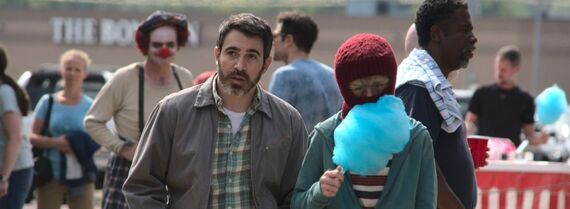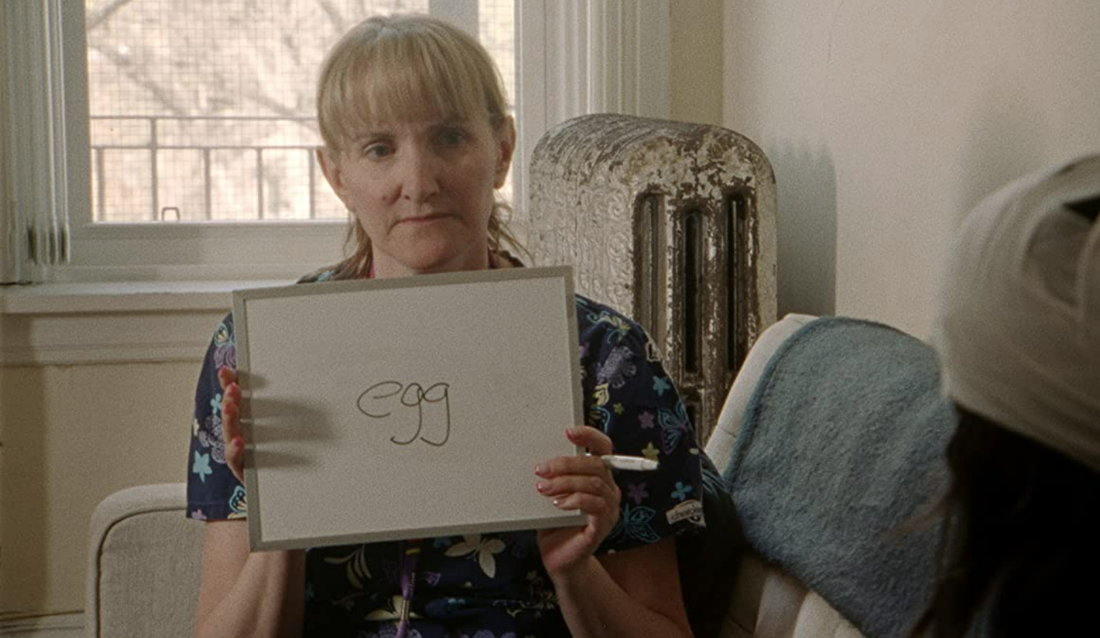|
Originally published on Elements of Madness ★★☆☆☆  Peter Flaherty as Eugene in CHOIR GIRL. Photography by http://www.FacesByRaphael.com | Melbourne Actors Headshots. Peter Flaherty as Eugene in CHOIR GIRL. Photography by http://www.FacesByRaphael.com | Melbourne Actors Headshots. Choir Girl sets up a story that begs to be told through pictures. Its protagonist, Eugene (Peter Flaherty), is a shy street photographer who hopes that his pictures will expose the hardships of everyday life in his neighborhood and, eventually, make him enough money to pack up and move somewhere better. But it’s not simply the main character’s profession as a photographer that makes this story so well suited for film. Choir Girl, the feature debut of writer/director John Fraser, is all about looking and being looked at, about capturing and criticizing images, and about creating perspective through the lens of a camera. Any narrative that is so centrally structured on these subjects is a narrative most artfully told through film or photography itself rather than words, music, or live performance. Films about film naturally develop multiple layers of self-reflexivity and can, in turn, create a self-aware viewing experience for the audience. Choir Girl sets the stage for such a viewing experience but, unfortunately, watches more like a rough first draft than a final cut. Although it is bubbling with potential, Choir Girl leaves much to be desired.
0 Comments
★★★☆☆ Excessive and explicit violence on screen always leads to questions about whether such images are necessary. If a director packs their movie with medieval torture and bodily trauma, does that violence serve a purpose, or is it simply a sadistic celebration of gore that delights in human pain? Is the audience expected to enjoy the blood and torture, or are they likely to have a more complex viewing experience? After watching the trailer for Sleepless Beauty, a torture horror film from director Pavel Khvaleev, I’ll admit that I had low expectations for the film as far as it’s use of violence, and I prepared myself for excessive gore with little meaning or thought behind it. However, I found myself pleasantly surprised by Sleepless Beauty, which, although by no means groundbreaking or flawless, makes a definite attempt to substantiate its numerous torture scenes with a bit of social commentary. While it does not succeed in every instance, Sleepless Beauty aims to create a sympathetic victim, explore her mental state, and ask relevant questions that go beyond the blood and guts on screen.
★★★★☆ When it comes to fantasy, I’ve always been most drawn to stories that emphasize the element of escape; stories in which the setting is not just a magical world, but a world that is within reach of our own reality. There’s something almost seductive about stories like The Lion, the Witch, and the Wardrobe, Peter Pan, or A Wrinkle in Time in which the characters just happen to stumble upon a wondrous world that’s only a flight away or behind the thin wooden back of a wardrobe. The idea that Narnia and Neverland could exist alongside reality endows my own world with a rich and thrilling potential energy. This is the sort of thrill I experienced while watching Martin Krejcí’s feature directorial debut, The True Adventures of Wolfboy, a delightful coming-of-age drama that combines the fantastical visual style of Tim Burton’s Big Fish (2003) with the adventurousness of timeless teen classics like Stand by Me (1986). Although the hero of the story, Paul, (Jaeden Martell) never actually crosses over into another world, and all of his adventures could, in theory, take place in our present reality, his journey exudes such heroic grandeur and wide-eyed fantastical wonder that it captures the thrill of a fantasyland just waiting to be discovered behind a door or down a rabbit hole.
Originally published on Elements of Madness 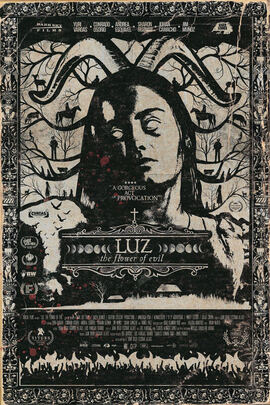 Last year, Ari Aster set the bar high for “daylight” horror films with Midsommar, a terrifying fantasy that casts its disturbing events against a beautiful, blossoming, sunlit backdrop. The genre-play proved to be quite successful for Aster, although the effect is not so much scary as it is genuinely disturbing. Fans of Midsommar will find a somewhat similar effect in Luz: The Flower of Evil, a folk-horror fantasy from writer/director Juan Diego Escobar Alzate. Combining the narrative elements of religious-cult horror films such as The Other Lamb (2019) with the vibrancy of Midsommar, Luz: The Flower of Evil is a stunning and layered exploration of faith, evil, and the search for meaning. Originally published on Elements of Madness 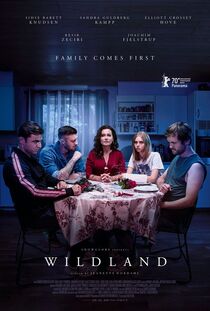 Although the Fantasia International Film Festival was held virtually this year, it still featured an incredible lineup of wild and visceral films that celebrated everything gory and horrific. Many of the featured titles were loud and boastful with their colorful characters and wacky situations, offering a whirlwind of both dreamy and nightmarish images. On the other hand, some of the films were softer with their style, offering up slow-burning, tense narratives and minimalist imagery that hit with just as strong of an impact. Among this second category of films is the feature debut of director Jeanette Nordahl, Wildland. A tense hybrid of family drama and crime thriller, Wildland is captivating from start to finish, despite its more subdued style. Originally Published on Elements of Madness 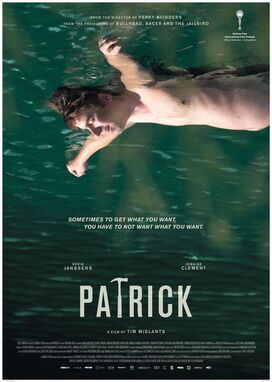 One of film’s unique narrative strengths is the camera’s ability to manipulate perspective. A movie can put us behind the mask of a serial killer on Halloween or on the tip of a shark’s nose just before it attacks. Point-of-view shots are both riveting and revolting. They force us to confront stomach-turning visuals, and yet, as we share the perspective of a character who we care about, we can’t turn away. In the case of Patrick, a selection from this year’s Fantasia International Film Festival, cinematographer Frank van den Eeden capitalizes on the power of perspective to create a detailed and accessible portrait of the emotionally unavailable title character. Patrick is a stylized, darkly comedic thriller that hones in on the anxiety of its antisocial protagonist, exposing (in more ways than one) the ridiculousness of the world around him. Originally published on Elements of Madness 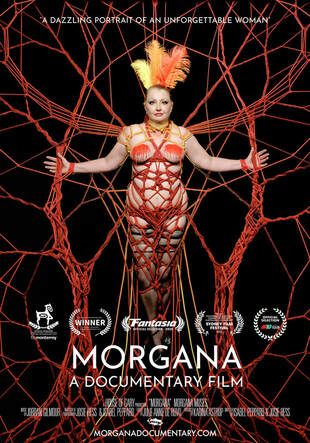 Among the list of things that you might expect to save your life one day, perhaps one of the least likely is a night with an escort and a headfirst dive into the world of feminist pornography production. For middle-aged housewife Morgana Muses, who had silently suffered through a loveless, sexless marriage for years, it just so happened that the simple act of holding hands with an escort while on a date to the theatre was exactly what she needed to start fighting back against overpowering suicidal thoughts. In a fantastical documentary about her life, which is simply titled, Morgana, this housewife turned porn-star shares the story of how she left behind a hollow, meaningless life to pursue a career in adult films, embarking on a healing journey that would give her the identity and community she had always craved. Directed by the feminist dynamite duo of Isabel Peppard and Josie Hess, Morgana is not just a documentary about porn and sex-work, but an invitation to flourishing self-love. As an official selection of this year’s Fantasia International Film Festival, Morgana gives women of all shapes, sizes, and ages permission to seek out people and communities that can meet their basic human needs, sexual or otherwise. Originally Published on Elements of Madness The Slamdance Film Festival, which runs at the same time and in the same city as the more widely known Sundance Film Festival, gives new and aspiring filmmakers the chance to showcase their work in front of other industry professionals. With independent and low-budget films in the lineup, Slamdance has served as a starting point for many filmmakers who later went on to find immense success, including Christopher Nolan, Ari Aster, and recent Oscar-winning director Bong Joon-Ho (Parasite). Among the films presented this year was Tapeworm, the feature debut of co-directors Milos Mitrovic and Fabian Velasco. The Canadian filmmaking duo has worked together before on short films like Imitations, which premiered at the Toronto International Film Festival in 2016. Collaborating again to write and direct, with Mitrovic acting as well, the two strike just the right tone with Tapeworm, a gritty and awkward comedy that turns life’s most ordinary and embarrassing moments into captivating vignettes.
|
"Our embodied spectator, possibly perverse in her fantasies and diverse in her experience, possesses agency...finally, she must now be held accountable for it." Categories
All
|

